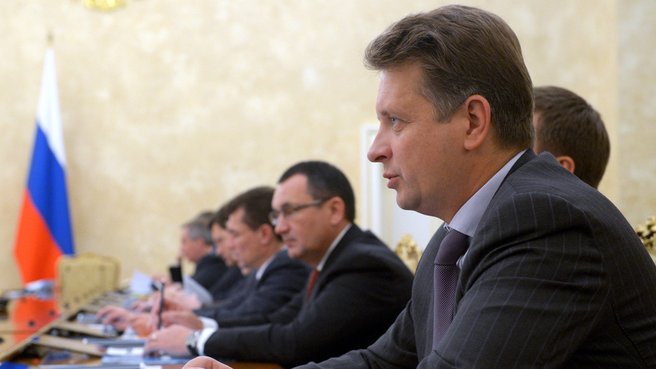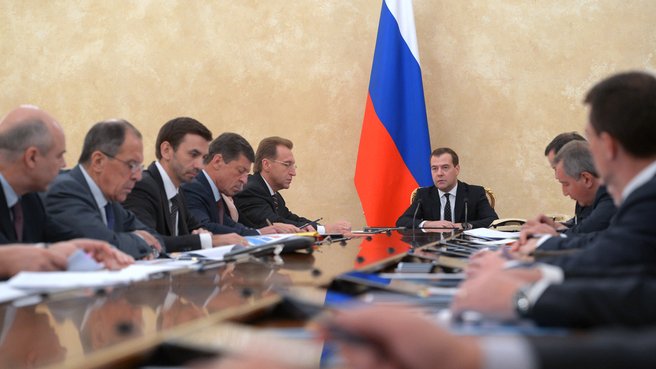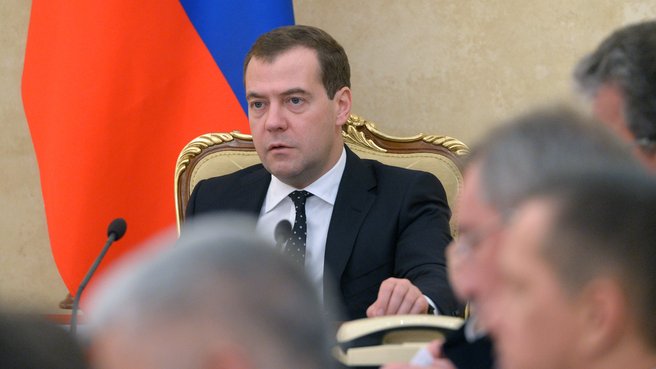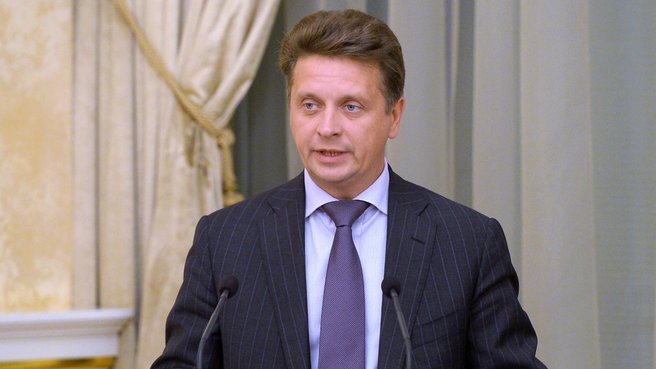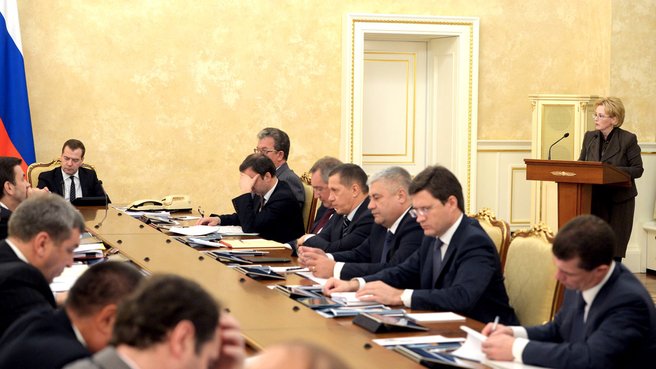The key issue on the agenda is the development of competition in the air services markets.
Introductory remarks by Dmitry Medvedev
Maxim Sokolov’s report on the current state of competition in the air services market
Transcript:
Dmitry Medvedev: Ladies and gentlemen, I’d like to say a few words about the recent tragedy in Kazan before starting our discussion. The Government has established a commission headed by the minister of transport. Its main task is to eliminate the consequences of the catastrophe and to render assistance to the bereaved families.
Obviously, decisions will be made on what the Government and other agencies should do to prevent such tragedies and to upgrade flight safety. However, it is already possible to express certain viewpoints.
Maxim Sokolov: Mr Medvedev, ladies and gentlemen, as we all know, a Tatarstan Airlines Boeing 737-500 flying from Moscow’s Domodedovo airport to Kazan crashed on touchdown on Kazan’s runway at 7:25 pm on 17 November with 44 passengers and six crew members on board. All of the passengers and crew members died in the accident. There were two foreigners on board – from Ukraine and Britain.
No damage was done to third parties or property. A government commission to help the bereaved families and a technical commission of the Interstate Aviation Committee (IAC) to investigate the catastrophe were established on the same day. <… >
The parametric data and cockpit voice recorders were found at the site of the crash. The IAC is decoding and analysing the recordings. Having conducted a preliminary analysis of the parametric data recordings, it has established that during the second approach the aircraft lost speed at a height of 700 metres and dived at an angle of 75 degrees.
It crashed on the ground almost vertically at a speed of over 450 km per hour. The commission has not found any information regarding the failure of the aircraft’s engines or other systems. It will conduct a detailed analysis of the accident in due time.
More than 1,200 people and over 150 units of equipment were involved in eliminating the consequences of the catastrophe. The decontamination of the territory was not necessary. The Investigating Committee and other agencies finished their work at 4 pm yesterday. All traces of the accident were removed. The aircraft’s fragments were brought to the airport’s Ramp No 38 and covered with large equipment. A temporary shed is now being assembled.
The bereaved families will be taken to the site of the tragedy today or tomorrow. All relatives, including those of the British citizen, have been contacted. Genetic material has been collected from almost all of the relatives. Insurance payments are already being made in accordance with legislation. The payment amounts to two million roubles. Another 25,000 roubles will be paid to account for funeral costs. The Republic of Tatarstan has made the decision to pay an additional one million roubles to each family. <…>
Flight data recorders have been found at the crash scene, with recordings of aircraft performance parameters as well as cockpit voice communications. The data is now being retrieved and analysed by the Interstate Aviation Committee. Preliminary findings suggest that after aborting the first attempt to land, the jetliner regained altitude only to be pitched into a nosedive. The near-vertical manoeuvre, carried out at a height of 700 metres and with an angle of minus 75 degrees, ended with the jet plummeting into the tarmac, at a speed of more than 450 km/hr.
No evidence of failure in any of the plane’s engines or control systems is available as of now. The Interstate Aviation Committee is carrying on with its data recorder analysis to find out all the details of the accident and determine its actual causes.
More than 1,200 personnel and 150 pieces of equipment took part in a cleanup effort. Decontamination of the crash scene and of the surrounding area was deemed unnecessary. All required work at the crash scene, including by the Investigation Committee, was completed by 4pm yesterday. All debris was cleared away from the crash scene overnight and was taken to a storage facility on the airport grounds.
The victims’ families will be given an opportunity to visit the crash scene later today or tomorrow. Contact has been established with the families of all those killed in the crash, including the British national. Genetic material has been collected from almost all the families. Insurance coverage is already being paid to them by the insurance company SOGAZ. The compensation amount due [for each of the victims] includes 2 million roubles in insurance payments plus 25,000 roubles for funeral expenses. The Republic of Tatarstan has also decided to pay an additional 1 million roubles for each victim. <…>
As for human remains, the Investigation Committee has at this point collected more than 800 pieces, and this amount is likely to increase. The Tatarstan Interior Ministry’s laboratory is currently holding 188 remains while another 100 are now at the Health Ministry. About 400 have been sent to Moscow for more sophisticated testing. Two of the bodies have been handed over [to the families] and the transfer of another five is to be made shortly.
Summing up, I’d like to say that all the services involved have been working in total coordination, with active support from the Tatarstan Government. The ad hoc Government commission is now providing organisational assistance to the Interstate Aviation Committee and the Investigation Committee, and it will continue working until all the tasks I’ve mentioned are fulfilled.
Dmitry Medvedev: I expect you to come up with proposals about how to improve the work of the carriers and crews, as well as other proposals designed to improve air transport in general based on the findings of the IAC technical commission and the investigative authorities.
Let’s move on to the agenda of the Government Presidium meeting. The point of our meeting today is to discuss ways to promote the competitive environment. This issue is high on our list of priorities. < ... >
Today, we will focus on pharmaceuticals and air transport. < ... >
The air transport market remains plagued by problems. There’s more to this than the tragedies that we have just discussed. The market structure is the main sticking point, especially domestic airlines, as 10 airlines account for a significant amount of traffic. That may not be a critical issue in and of itself, but the issue concerns the proportions. With regard to ground services, nearly half of all federal airports are serviced by a single operator, which gives rise to questions to say the least.
We should focus on removing administrative barriers and reasonably increasing the number of market participants, including independent suppliers and, with certain reservations, carriers. Why reservations? Because we already have a fairly large number of air carriers. How many do we have, Mr Sokolov?
Maxim Sokolov: 122.
Dmitry Medvedev: See? However, we are well aware that 85% to 90% of them are weak operators in terms of their material and financial capabilities. Quite likely, the professional level of their crews poses problems, too. Therefore, our task is to promote the competition and help air carriers become better service providers in the process. We may even have to consolidate them where necessary. However, this should not be detrimental to the competition.
Dmitry Medvedev: "Ground services at airports are a sector that has almost no competition in Russia. It is important to have alternative operators that handle luggage, organise in-flight food services, and provide services to business aviation."
It’s important to create new regional and low-cost carriers. The first two regional companies will soon start operating on the Russian market – Aurora (an Aeroflot subsidiary) and the low-cost Dobrolet company.
Ground services at airports are a sector that has almost no competition in Russia. It is important to have alternative operators that handle luggage, organise in-flight food services, and provide services to business aviation. Eventually, there must be non-discriminatory access for participants to the services provided by infrastructure monopolies. I’m referring to simple things like the availability of several refueling companies at airports, which is standard practice at major international airports, but not in Russia.
We must not forget another important point – reliable air navigation, high-quality maintenance services, and highly skilled crews are definitely important safety issues and saving on these things is unacceptable. This is the best competitive edge for any airline.
With regard to regional transport, clearly, it’s imperative to develop routes that bypass Moscow and increase the number of international flights departing from Russian regions.
A situation where three quarters of the nation's passenger traffic passes through Moscow can hardly be considered normal. We’ve already made some progress in this area, though.
Dmitry Medvedev: "The competitive environment on the market of medical services must fundamentally change the relationship between the doctor and patient. Ideally, patients should have a choice of doctors. The competitive environment should incentivise doctors to improve the quality of care that they provide."
The second point concerns promoting competition on the pharmaceuticals and medical services market. < ... > The competitive environment on the market of medical services must fundamentally change the relationship between the doctor and patient. Ideally, patients should have a choice of doctors. The competitive environment should incentivise doctors to improve the quality of care that they provide.
Russia is a vast country and it’s hard to ensure full competition on the medical services market in every single segment. I'm referring to remote and sparsely populated areas. It’s hard to make doctors go to work there simply because there’s no market in such areas and doing business there makes no economic sense. Therefore, the state will have to intervene and ensure the availability of high-quality medical services in such areas. I believe that this will be the case for a very long time in the future.
Dmitry Medvedev: "The number of private medical organisations that work in the MMI system and participate in the implementation of the state guarantee programme has doubled from 618 in 2010 to 1,250 in 2013 over the past three years and this number is likely to continue to grow."
The situation is different in densely populated areas and regional capitals and in Moscow where the transport infrastructure is well-developed. They see new medical organisations, medical centres and in-patient facilities open there all the time. The number of private medical organisations that work in the MMI system and participate in the implementation of the state guarantee programme has doubled from 618 in 2010 to 1,250 in 2013 over the past three years and this number is likely to continue to grow. We pin out hopes in this area on private-public partnership arrangements. < ... >
The pharmaceutical market is growing very rapidly. We are among the world leaders in this segment, and the development of a normal competitive environment in this field will allow us to produce effective, safe and affordable medicines. It will make the development of modern medicines profitable for all market players.
It is necessary to pay attention to three points. First, we should create fair conditions for setting prices of medicines. Second, we must improve the procedures for registering medicines. And third, we must elaborate standards for their production.
We have long planned to switch to GMP international standards, which determine requirements to the production of medicines. The Ministry of Trade and Industry should make it a priority simply because this is the norm. The entire world is taking this road.
<…>
Maxim Sokolov: This is a report on the competitiveness of the airline industry. Air transport has been steadily growing since 2009. Its growth rates – about 15% per year – are triple the world average. This is one of the most competitive fields both at home and abroad.
Tough competition from international and domestic airlines, on the one hand, and the monopoly environment, on the other, lead to low return on revenue. The average figure for 2013 is 1.6%.
In the past nine months of this year, passenger air traffic has increased by 14% as compared to the relevant period in 2012. Tentatively, the number of passengers is expected to reach 83 million by the end of the year. All in all, airports in the Russian Federation will have served over 100 million passengers.
Maxim Sokolov: "Air transport has been steadily growing since 2009. Its growth rates – about 15% per year – are triple the world average."
According to international practice, GDP growth at 1% leads to an increase in air transport by an average of 2–3%. In Russia, 1% GDP spurs an air transport increase of 10%, which shows that the Government has taken efficient measures to promote competition in this area. In 2007, it removed all administrative barriers blocking access to the domestic air transport market, separated airlines from companies servicing airports, provided access to the services of natural monopolies at airports, and took measures to curtail the growth of tariffs for the latter.
Ten large domestic airlines account for 75% of all domestic passenger traffic. The bulk of it – also 75% – goes through the Moscow air hub. All in all, domestic airlines carried 35.5 million people. The average growth rates have been about 3-4% per year since 2000. Owing to the adopted measures, we expect the rate to approach 16.5% this year, with the passenger traffic increasing to 8.5 million people.
Competitive routes serviced by three and more carriers, rather than one or two, account for four-fifths of all air travel. Their share is steadily growing and increased from 73% in 2007 to 85% in 2012. These are mostly routes linking large administrative centres – not only Moscow, but also St. Petersburg and Novosibirsk – with other places. On such routes, tickets are much less expensive than on those where one or two airlines operate. <…>
Regional and local air transport accounts for no more than a quarter of all air passenger traffic. Regrettably, the average price of tickets for a domestic economy-class return flight is 23,000 roubles, or about 90% of the average monthly salary. In the United States, the relevant figure is 5-10%. This shows that regional and local routes are not developed and competition is not strong enough. Moreover, the frequency of air travel in Russia is three to four times lower than in the European Union or the United States.
Dmitry Medvedev: This frequency is determined by the number of flights per capita during a year.
Maxim Sokolov: Yes, exactly – per capita. Our figure is 0.6, the EU –1.6, and the United States – more than 2.5.
Promoting competition is very important for airport services markets. In over 43% of all the airports of federal significance it is the main airport operators who provide the whole range of airport services. But international practice has proven that all ground handling services should be provided on a competitive basis.
To protect consumer interests, in 2009-2010, the Government approved airport services rules which stipulate equal conditions for services provision, priority ranking of services, standards for information disclosure and other issues. This document, drafted by the Federal Antimonopoly Service and the Ministry of Transport, stipulated the work of competing operators in airports and the conditions for promoting competition. Due to this new practice, to these new rules, the situation in the airports has improved significantly over the past two and a half years. A competitive environment is being shaped, in some segments there are already from two to seven ground handling operators. <…>
I would like to say a few words about jet fuel. It still accounts for the largest part of airline companies’ spending, almost one third of the total sum. That is why the Ministry of Transport, the Federal Antimonopoly Service, the Ministry of Energy and the Federal Customs Service have been constantly monitoring all the oil market indicators over recent years, including the selling prices set by oil refineries.
Maxim Sokolov: "In the first six months of 2013, the exchange turnover of aviation fuel was almost one million tonnes, which exceeds the turnover for the previous period by 25%, and already accounts for almost one-fifth of the total jet fuel production in the Russian Federation."
A legal framework has been worked out to develop stock exchange trade and to establish market prices in stock trading. These measures helped create a commercial infrastructure for the oil market. In addition, stock exchange trade in net fuel and registration of non-exchange transactions have been developing rapidly.
In the first six months of 2013, the exchange turnover of aviation fuel was almost one million tonnes, which exceeds the turnover for the previous period by 25%, and already accounts for almost one-fifth of the total jet fuel production in the Russian Federation. Last year, jet fuel consumption was estimated at 7.5 million tonnes (or slightly more). In general, all market participants have noticed the stabilised growth in jet fuel prices this year…
Dmitry Medvedev: Am I right saying few airports that have several fuel suppliers?
Maxim Sokolov: The legal framework stipulates that each airport with passenger traffic of one million people a year should have two refueling facilities. Today, 18 airports meet these requirements, but by the end of 2013, this number may increase to 20 or even 21.
Dmitry Medvedev: Do they really have two or more fuel suppliers? I mean, can we control this?
Maxim Sokolov: Yes, we do control this and the system is developing. Airports with more than five million passengers a year (we have four airports of this kind in this country) should have three competing fuel suppliers, I mean one main one and two additional ones, three fuel companies in total.
The Road Map specifies a number of areas which need to be addressed, including the introduction of requirements for large airports to have two or more providers of different ground handling services as well as the introduction of non-returnable fees. <…>
We had a long discussion on lifting the restrictions for foreigners to work as pilots in Russia and we have come to a final decision. We expect the Government to discuss this issue in the first ten days of the month. We also would like to discuss the option for airline companies to exclude the fare for onboard meals and luggage, if a passenger has none, from passenger fees, because at the moment, a fare for 10 kilogrammes of luggage is included in the price.
Dmitry Medvedev: Representatives of some air carriers have told me that it was very important for air traffic legislation to stipulate the possibility of terminating contracts of carriage without reimbursing passengers for ticket costs. In reality, according to current air traffic legislation and overall transport legislation, this is inadmissible. In the latter case, ticket costs are usually reimbursed either fully or in part. This is believed to be very important for these flights because some foreign companies operate precisely in accordance with these principles. You should also pay attention to this.
Maxim Sokolov: Speaking of our activities, this issue is now in the so-called advanced stage of our work. The Government has reviewed it at various meetings.
Moreover, the liberalisation of inter-governmental air traffic agreements is an extremely important issue for expanding competition on the international air traffic market. This concerns the elimination of restrictions on the number of air carriers, scheduled routes, radio frequencies and, quite frequently, prices and rates also being stipulated by inter-governmental agreements. The Ministry of Transport is working systematically with aviation authorities, and we have already reached agreements with a number of countries on lifting restrictions for airline operations. For example, we have reached an agreement with Ukrainian aviation authorities, and Ukraine virtually stipulates an open skies regime for Russian airlines. All chartered flight restrictions have been lifted for Moldova, with the exception of the Moscow-Chisinau route, where we plan to eliminate these restrictions starting in the 2014-2015 winter season. All restrictions on the number of official air carriers have been lifted for the Republic of Belarus, except the Moscow-Minsk route. We are also working actively to liberalise air traffic agreements with other countries. Restrictions for chartered flights to Bulgaria and Cyprus have been lifted, and we have agreed to introduce a second air carrier. The number of official air carriers and flights has been increased on Russian-Greek routes. There is a notable example in Vladivostok, where restrictions have also been lifted for the number of official air carriers operating between the Republic of Korea and Vladivostok. The number of air carriers has been increased on the Moscow-Rome, Moscow-Milan and Moscow-Paris routes. In fact, their number has increased to two for each country.
Unfortunately, our relations with certain CIS colleagues are still on a somewhat archaic footing. Proposals to liberalise air traffic with Kazakhstan, Uzbekistan, Tajikistan and Turkmenistan have been turned down and no headway has been made so far on this issue.
The IATA (International Air Transport Association) standard is a case in point with respect to fulfilling airline safety requirements. This standard is called IOSA. Since complying with this standard is mandatory for companies seeking to join international airline alliances, it enhances their competitiveness. IOSA standards have been adopted by 18 Russian airlines, including Tatarstan Airlines, which implemented it this summer.
Russia’s air laws and its state security management system for air transport are continually being improved in line with the standards of the International Civil Aviation Organisation (ICAO). Two federal laws have been adopted this year to implement the ICAO’s international standards with respect to ensuring government supervision of personnel qualifications and training, as well as standards for the state security management system for civil air transport. I would like to note that, in this case, promoting competition does not run counter to the objective to ensure flight safety, though it calls for extra funding since complying with high security standards is a must for enhancing the competitiveness of airlines on the Russian market and on the international market even more so.
All in all, consecutive steps to build a competitive air transport market while enforcing high security standards have already made it possible for us to deliver on the roadmaps’s targets with respect to promoting competition in civil aviation.
<…>

